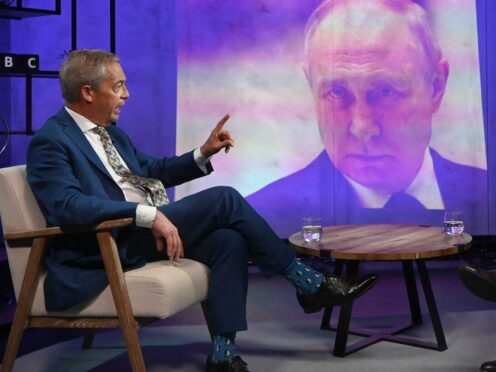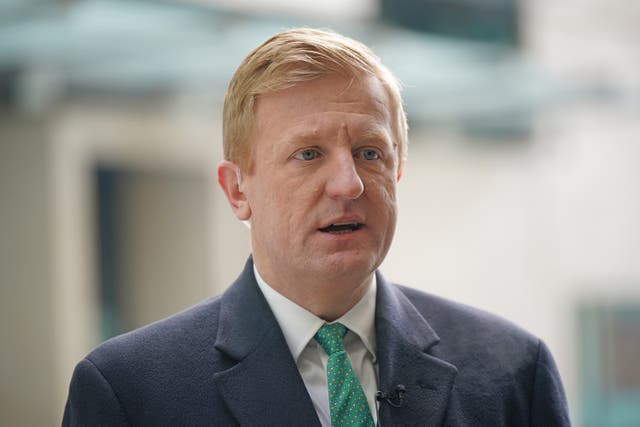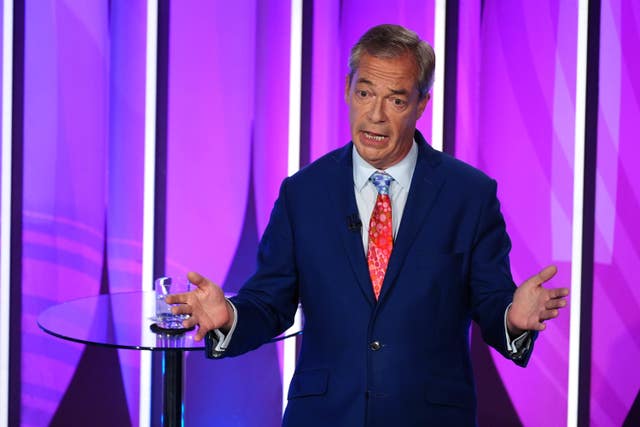
Claims that Russian-inspired bots might be posting on social media to interfere with the General Election are “cobblers”, Reform UK’s leader has said.
Nigel Farage made his remarks after the Australian Broadcasting Corporation (ABC) named five Facebook pages which the broadcaster claimed were linked, had shared pro-Russian Kremlin narratives, and in some cases had supported Reform UK.
Deputy Prime Minister Oliver Dowden described the ABC’s findings as “gravely concerning”.
Asked about the automated technology on Sky News’s Sunday Morning With Trevor Phillips, Mr Farage responded: “Oh, don’t talk cobblers.”
He added: “I mean you had this, this, this bland fellow on earlier who apparently is the Deputy Prime Minister, who no-one knows who he is, and there he is saying, ‘oh, there are Russian bots involved’.
“Hang on, did you ask him how many millions of pounds his party have taken from Russian sources over the course of the last few years?
“This is the Russia hoax.”
Mr Dowden appeared on the same programme and described the use of social media as “a classic example from the Russian playbook”.
The Deputy Prime Minister said: “What I would say is this is relatively typical, low-level stuff, but we stood up the election cell in the Cabinet Office, we did that at the very beginning of the campaign, and it was designed to look into exactly this sort of thing and I think that … it should just be a salutary reminder for all of us, when you engage on social media, are these people that you think are posting stuff, are they real or are they bots generated by hostile state actors?”
Responding to the ABC investigation in The Sunday Times, Mr Dowden said: “Malign foreign actors, promoting British political parties, policies and views that fit their agenda is just another example of the challenges in the increasingly volatile cyberspace of the 21st century and is gravely concerning to see during an election campaign.”
The newspaper also reported that Conservative Party chairman Richard Holden had written to Simon Case, the Cabinet Secretary, and Sir Tim Barrow, the National Security Adviser, asking for the claims to be investigated.

According to ABC, the five pages it found appeared to have little in common but were linked through an examination of the location data attached to the pages’ administrators, the tracking of paid ads, and an analysis of the pages’ similar or shared content, which often appeared to be synchronised.
The broadcaster also reported most of the administrators for each page were based in Nigeria, which is a significant connection as previous online Russian propaganda networks were found to have been operating from Africa.
ABC shared a fake AI-generated image, allegedly posted by one of the accounts, which depicted at least five full dinghies on the sea near chalk cliffs.
Two accounts are reported to have described Mr Farage as “the people’s champion”.
Mr Farage, who is contesting the Clacton constituency in Essex, has previously come under fire for his comments about Russian president Vladimir Putin.

He told the BBC’s Panorama Interviews earlier in June: “I said I disliked him as a person, but I admired him as a political operator because he’s managed to take control of running Russia.”
On the conflict in Ukraine, Mr Farage said: “We provoked this war.
“It’s, you know, of course it’s his fault – he’s used what we’ve done as an excuse.”
Home Secretary James Cleverly at the time accused Mr Farage of “echoing Putin’s vile justification for the brutal invasion of Ukraine”, while shadow defence secretary John Healey said the Reform UK leader would “rather lick Vladimir Putin’s boots than stand up for the people of Ukraine”.
On Sunday, Mr Farage told Sky News that Putin was a “very, very dangerous” man.

Enjoy the convenience of having The Sunday Post delivered as a digital ePaper straight to your smartphone, tablet or computer.
Subscribe for only £5.49 a month and enjoy all the benefits of the printed paper as a digital replica.
Subscribe